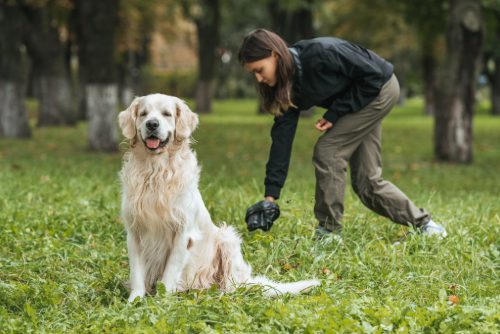Dog Poop: A Guide to Your Dog’s Digestive Health
Ever wondered what your dog’s poop is trying to tell you? It might not be the most glamorous part of pet ownership, but monitoring your dog’s poop can give you important insight into their digestive health. Changes in color, consistency, and frequency can point to dietary issues, infections, parasites, or other health concerns. In this blog, we’re diving into the details of dog poop so you’ll know what’s normal, what’s not, and when it’s time to contact your veterinarian. If you’re ever in doubt, call All Pets Vet Hospital in Branchburg, NJ at 908-707-1555 to schedule a visit.

What Does Healthy Dog Poop Look Like?
Not all dog poop is created equal. Healthy dog poop typically has a few key characteristics that reflect good digestive function and overall health.
Color
Normal dog poop is chocolate brown. This color results from the breakdown of bile during digestion. Lighter shades may indicate issues with the liver or pancreas, while very dark or black stools may suggest bleeding in the upper gastrointestinal tract. Bright red streaks could be a sign of bleeding in the lower tract.
Shape and Consistency
Healthy dog poop should be log-shaped and firm, similar to the texture of Play-Doh. It should hold its shape when picked up but not be too dry or hard. Soft, shapeless poop can point to poor nutrient absorption or an imbalance in gut bacteria. On the other hand, overly hard stool may suggest dehydration or lack of fiber.
Size and Frequency
A well-balanced diet typically results in regular, moderately sized stools. If your dog is pooping more frequently than usual or passing large volumes, it could mean they’re eating too much fiber or not absorbing nutrients properly.
What Causes Unhealthy Dog Poop?
When dog poop looks or smells off, it’s often a sign of an underlying issue. Identifying the cause can help you and your vet take appropriate next steps.
Dietary Indiscretion
Dogs love to explore the world with their mouths, and that can lead to eating things they shouldn’t—spoiled food, garbage, or even non-food items. These dietary missteps can quickly upset your dog’s stomach, leading to diarrhea, vomiting, or strange-looking poop.
Food Sensitivities or Intolerances
Some dogs react poorly to certain ingredients in their food. Common culprits include beef, chicken, wheat, soy, and dairy. If your dog’s poop is consistently loose, mucus-covered, or oddly colored, it could be related to what’s in their bowl.
Intestinal Parasites
Worms such as roundworms, hookworms, and tapeworms can affect your dog’s stool. You might see visible worms or eggs, though not always. These parasites can lead to diarrhea, weight loss, and overall poor health if left untreated.
Infections and Illness
Viral, bacterial, or fungal infections can significantly impact your dog’s digestive system. Parvovirus, for example, causes foul-smelling, bloody diarrhea and requires immediate veterinary care. Chronic conditions like inflammatory bowel disease (IBD) may cause ongoing stool irregularities.
When to Worry About Dog Poop Changes
While occasional soft or odd-looking poop isn’t always cause for concern, some symptoms suggest it’s time to reach out to your veterinarian in Branchburg.
Persistent Diarrhea or Constipation
If diarrhea lasts longer than a couple of days or if your dog is straining without producing stool, it’s time for a professional exam. Ongoing issues could signal more serious conditions like obstructions, infections, or chronic inflammation.
Presence of Blood, Mucus, or Foreign Objects
Red or black streaks in stool, visible mucus, or pieces of fabric or plastic should not be ignored. These signs often point to internal irritation, bleeding, or ingestion of foreign objects, which may require medical intervention.
Changes in Behavior or Appetite
When stool issues come with vomiting, lethargy, or loss of appetite, a larger health issue could be at play. These symptoms combined with abnormal dog poop should prompt a visit to your vet right away.
How Diet Impacts Dog Poop
What goes into your dog directly affects what comes out. High-quality, well-balanced food leads to more consistent and healthy dog poop.
Importance of Consistency in Diet
Switching your dog’s food too quickly can result in upset stomach and diarrhea. Always transition slowly over 7 to 10 days to give your dog’s digestive system time to adjust.
Fiber and Digestive Support
Fiber helps regulate stool consistency. Soluble fiber, found in ingredients like pumpkin and oats, can firm up loose stool, while insoluble fiber supports gut motility. Some dog foods include prebiotics and probiotics to support healthy gut flora.
Hydration and Its Role
Proper hydration helps maintain ideal stool consistency. Dogs who don’t drink enough water may develop hard, dry poop. Ensure your dog has access to clean, fresh water at all times, especially during warmer months or after activity.
Recognizing Dog Poop Types and What They Mean
Noticing variations in your dog’s poop helps you track their health more closely. Here are some common dog poop types and what they may indicate:
- Soft with Shape: Soft but formed stool may suggest dietary sensitivity or mild stress. It’s not always urgent but should be watched closely, especially if it happens frequently.
- Watery Diarrhea: Liquid stool often points to infection, parasites, or sudden dietary changes. If it lasts more than a day or two, it’s time to call your vet.
- Greasy or Shiny Stool: A greasy appearance can indicate too much fat in the diet or a condition affecting the pancreas. If you notice this regularly, bring a sample to your veterinarian.
- Yellow or Gray Stool: Pale yellow or gray dog poop may suggest issues with bile production or liver function. It’s less common but can be a sign of something that needs attention.
Why Picking Up Dog Poop Matters
Beyond monitoring your pet’s health, cleaning up after your dog plays a role in protecting other pets, people, and the environment.
Disease Prevention
Dog poop can carry parasites and bacteria that pose risks to other dogs and humans. Prompt cleanup prevents the spread of illness in your community and helps keep local parks, sidewalks, and yards safe.
Environmental Impact
Leftover dog poop can wash into storm drains and contaminate water sources. Picking it up helps reduce pollution and supports local ecosystem health.
Legal and Social Responsibility
Many communities, including Branchburg, NJ, have leash and waste cleanup ordinances. Failing to pick up after your dog can result in fines and frustration among neighbors.
Staying Informed and Proactive About Digestive Health
Understanding what your dog’s poop says about their digestive health gives you a valuable tool to support their wellbeing. You don’t need to become an expert, but noticing changes in your dog’s stool can help you recognize early signs of potential problems. If you’re concerned about your dog’s poop or overall digestive health, call All Pets Vet Hospital at 908-707-1555 to schedule a checkup. We’re here to help you support your dog’s health at every stage of life.
Recent Posts
About Us
Small description of the practice goes here - maybe pull from the About Us page?
